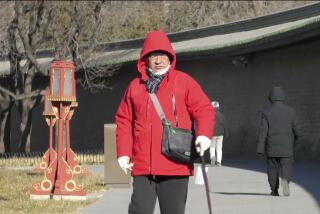Flu Shots Found Less Useful for Elderly
Vaccinating the elderly against influenza is not as effective as researchers had previously believed, government researchers reported Monday.
Although previous studies have suggested that flu shots reduce mortality among the elderly by 50% to 80%, a new study of three decades of mortality data indicates that widespread use of the vaccine has not been nearly that effective, and may not have reduced deaths among the elderly at all.
Because of uncertainties about the causes of death among the elderly and statistical vagaries, “we could not rule out some benefit from the vaccine, but it is less efficacious than we thought,” said epidemiologist Lone Simonsen of the National Institute of Allergy and Infectious Diseases, who led the study, reported in the Archives of Internal Medicine. “And we only looked at deaths, not other complications.”
During the period covered by the study, vaccination rates increased from 15% to 20% to about 65%.
A second study in the same journal, by researchers from the Netherlands, found that vaccination was highly effective for younger people, reducing deaths by 78% and hospitalizations for complications by 87%.
But researchers have long known that people older than 65 do not respond as well to the flu vaccine -- or to most other vaccines. Their immune systems are not as effective at generating antibodies against the virus as those of younger people.
Simonsen speculated that the protective effect of vaccination seen in previous studies reflected an unforeseen bias.
Several studies, she noted, have shown that the most seriously ill patients in hospitals and nursing homes did not receive the vaccine, while those who were healthier did. When the sickest patients subsequently died, the statistics made it appear that the vaccine was the reason the healthier patients had survived.
Immunizing the elderly should continue, Simonsen said: “We’re not saying the vaccine should not be given to the elderly. Even at half the [protective] rate, it’s better than nothing.”
Like many other experts, however, Simonsen said the most effective way to protect the elderly was to vaccinate the people who worked around them and to vaccinate most schoolchildren, the most prolific carriers of the disease.
Some studies have shown that vaccinating more than 70% of schoolchildren would eliminate the need to vaccinate the elderly.
A spokesman for the Centers for Disease Control and Prevention said Monday that it was unlikely the agency would change its vaccine recommendations based on one study.






